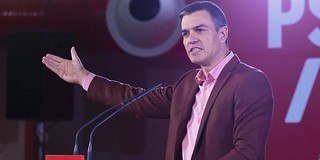Javier Milei and the blatant manipulation campaign of the 'far-journalists'
You are very young, but there was a time when in politics there was right and left. Today there is only the left and the extreme right.
The media that has labeled Milei as 'far-right'
The idea that the political map has remained this way is not mine. It is what is distinguished daily in many media. The examples are abundant and the most recent is Javier Milei, the classic liberal candidate for the presidency of Argentina. This Sunday, and as they have already done with the elections in other countries, the Efe agency, RTVE, El País, Abc, Público, Antena 3, the COPE, La Sexta and Cadena SER (just to give a few examples), have agreed in describing Milei as "far-right" or "extreme right".
The use of that word to stigmatize those who disagree
Milei may be more or less liked by those who dictate the ideological line of those media, but he is a democrat. Years ago, terms such as far-right or far-left were reserved for antidemocratic and violent extremists, for those who from one side or another of the political map support dictatorships and justify the use of violence for political purposes. But the left decided to change that definition to demonize all those who oppose it, taking advantage of its dominant position in areas such as journalism and universities.
As a result of this, today "far-right" has become a way of censoring ideas that are uncomfortable for the hegemonic left, a left that has managed to have its ideological dogmas assumed not only by people who say they are left, but also by many who call themselves "centrist" or "center-right." Today, those who disagree with a unique leftist form of thought that does not tolerate discrepancy are called "far-right". It does not matter that you defend democracy and propose your ideas through legal and peaceful means: if you not submit to the dogmas of the left, you are "far-right", although your ideas are much more democratic than those of those who call you extremist.
They see far-right everywhere but they don't see the far-left
On the contrary, for that dominant left, the "far-left" does not exist. They consider that being left-wing is the correct thing to do and in that particular concept of correctness there seems to be no extreme positions. There are politicians and parties that support communist dictatorships and justify attacks on their rivals, as has happened in Spain with the communists of Izquierda Unida and Podemos, but very rarely does a media outlet dare to call them "far-left". Apparently, the left is something elastic and enormous in which everything fits, even the worst forms of fanaticism, without anyone daring to call you "far-left."
We are, without a doubt, facing one of the most extensive manipulation campaigns that have been carried out in a democratic society, a campaign promoted by activists who call themselves journalists, by communication professionals who do not They are content with recounting facts, but they intend to dictate to people how they should think, stigmatizing anyone who leaves the fold in a way that is very reminiscent of pre-democratic societies. The fair thing would be to start counterattacking: those who act like this are not journalists, but ultra-journalists, people who believe that their profession goes beyond what is marked by professional ethics and who see themselves as modern inquisitors of a single thought that does not accept one of the pillars of democracy: political and ideological pluralism.
---
Photo: AFP.
|
Don't miss the news and content that interest you. Receive the free daily newsletter in your email: Click here to subscribe |
- Most read
- The Pegasus case and how it could end with Pedro Sánchez due to a decision by France
- What did Morocco find in Pedro Sánchez's cell phone to humiliate him in this way?
- The real reason for Sánchez's victimizing letter using his wife as an excuse
- A large collection of Volkswagen cars hidden in an abandoned mine in Switzerland
- The brutal 'touch and go' of a Lufthansa Boeing 747 at Los Angeles Airport
- US F-35A fighters flying with Polish F-16s over Poland at a time of great tension
- The episode of 'The Simpsons' that explains Pedro Sánchez's victimizing maneuver

 ES
ES





Opina sobre esta entrada: